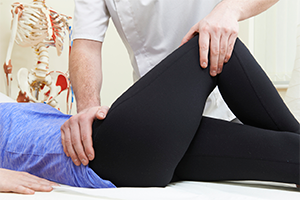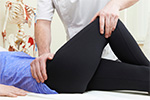
Hip pain can make simple tasks such as picking up objects or climbing stairs difficult. Once the pain gets to a point that your quality of life is significantly affected, you should seek professional medical help. Your doctor will discuss suitable treatment options based on a physical evaluation.
Non-surgical treatments are usually recommended as your first option before undergoing more invasive treatments or may be your only option if you must avoid surgery for health reasons. There are several treatments to manage hip pain without surgery. Some of these are outlined below:
- Medications: Medications are usually the first line of treatment for hip pain due to arthritis. Over-the-counter pain relievers and non-steroidal anti-inflammatory drugs (NSAIDs) may be recommended. If these fail to alleviate symptoms, your doctor may prescribe stronger NSAIDs. Drugs called DMARDs (disease-modifying anti-rheumatic drugs) may be recommended for hip pain from rheumatoid arthritis.
- Exercise: Exercise strengthens the muscles around the hip and can improve hip flexibility. This can lead to reduced pain and better function. In some cases, however, exercising can worsen your hip pain. If you have advanced arthritis, speaking with your doctor is advised before starting an exercise program.
- Physical Therapy: A physical therapist can develop an individualized program to reduce your symptoms such as pain and swelling, strengthen the hip and improve function.
- Weight Loss: The hips are weight-bearing joints. Those with hip arthritis are often overweight. The stress caused by excessive body weight multiplies with activities such as running or climbing up steps. Losing weight can significantly help if you have hip pain due to arthritis.
- Physical Aids: Physical aids such as braces or walkers help take stress off the hips. They are recommended for those who have considerable pain or are in danger of losing balance and falling. You can also use special aids to help you with certain activities such as reaching objects or putting on your shoes.
- Injections: If pain is more intense, your doctor may recommend joint injections such as corticosteroids or hyaluronic acid (viscosupplementation). Corticosteroids help reduce inflammation and hyaluronic acid helps improve the lubricative properties of joint fluid.
- PRP Therapy: Your doctor may also recommend newer regenerative medicine treatments such as platelet-rich plasma which harness the body’s healing potential. Cells from your own body are obtained, processed, and injected into the hip joint to promote healing and regeneration.
If you suffer with chronic hip pain, discuss with your doctor the various nonsurgical options that may be effective for your condition before considering surgery.
Dr. Domb is a nationally recognized orthopaedic surgeon specializing in sports medicine and arthroscopic surgery of the hip, shoulder and knee. A noted pioneer in advanced new techniques in hip arthroscopy, he delivers innovative treatments for patients with hip injuries such as impingement and labral tears. Dr. Domb is also an expert in arthroscopic surgery of the shoulder and knee, adept in specialized techniques including arthroscopic rotator cuff repair and all-inside ACL reconstruction.

